2022年中考英语知识点学习情态动词课件(共有PPT22张)
文档属性
| 名称 | 2022年中考英语知识点学习情态动词课件(共有PPT22张) | 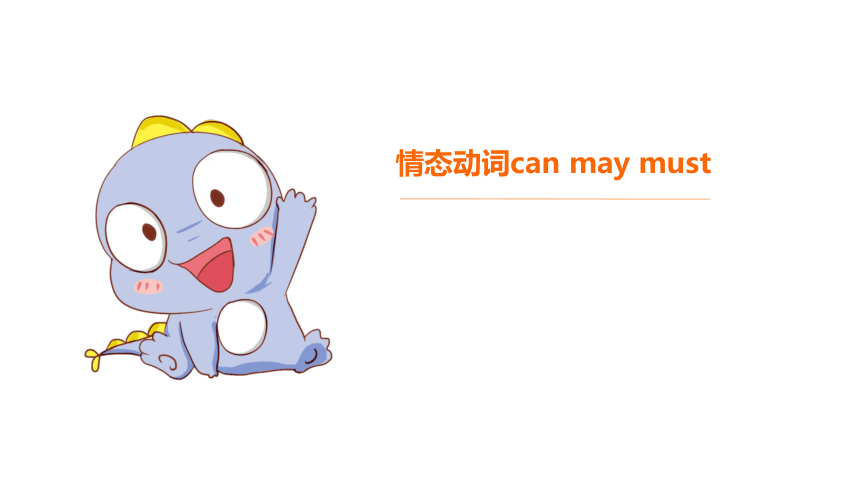 | |
| 格式 | zip | ||
| 文件大小 | 1.4MB | ||
| 资源类型 | 教案 | ||
| 版本资源 | 通用版 | ||
| 科目 | 英语 | ||
| 更新时间 | 2022-01-26 22:27:27 | ||
图片预览

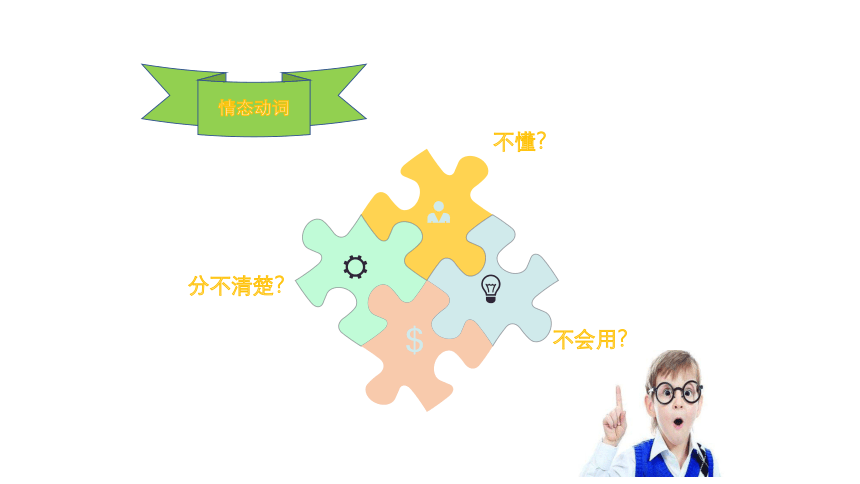
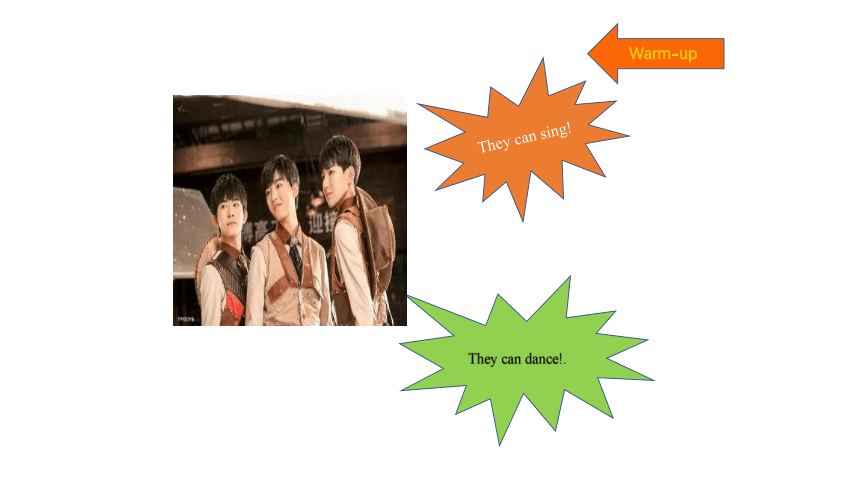
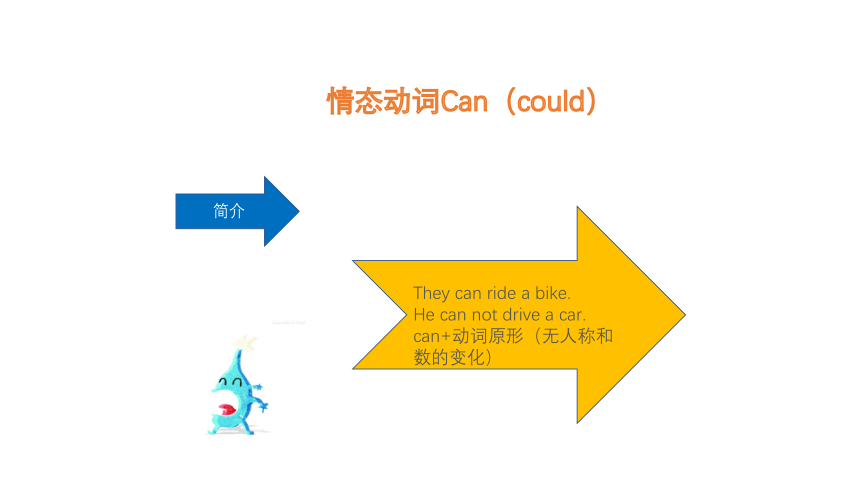
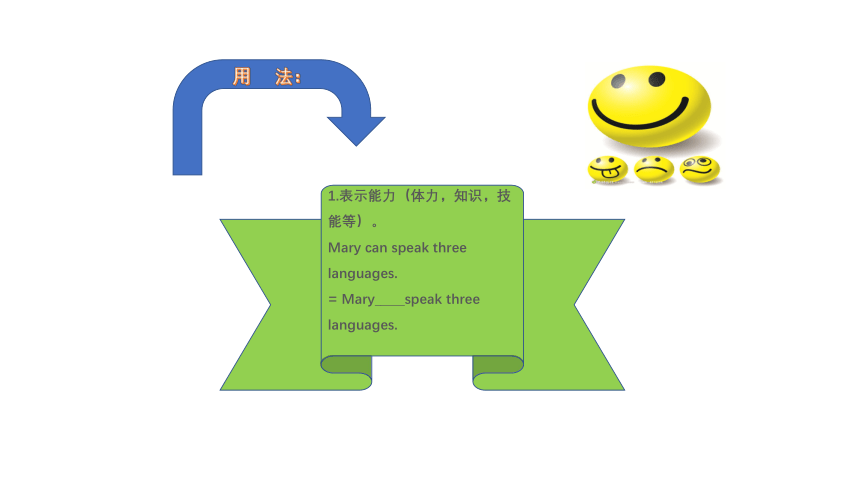
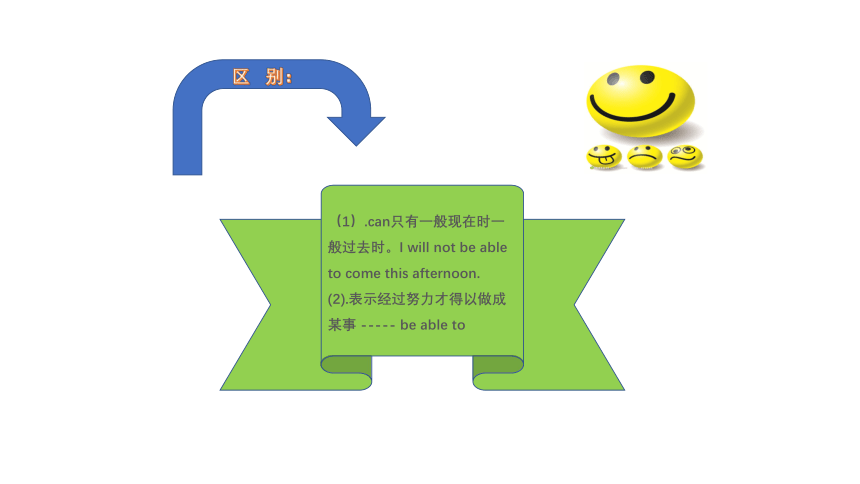
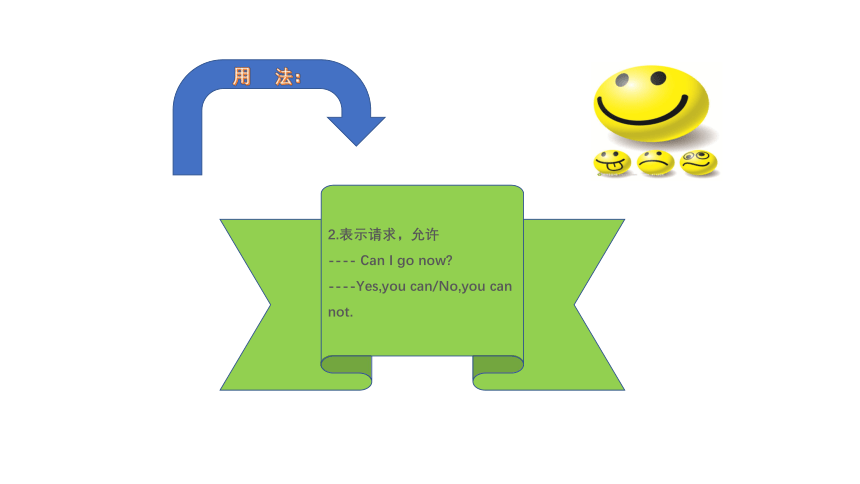
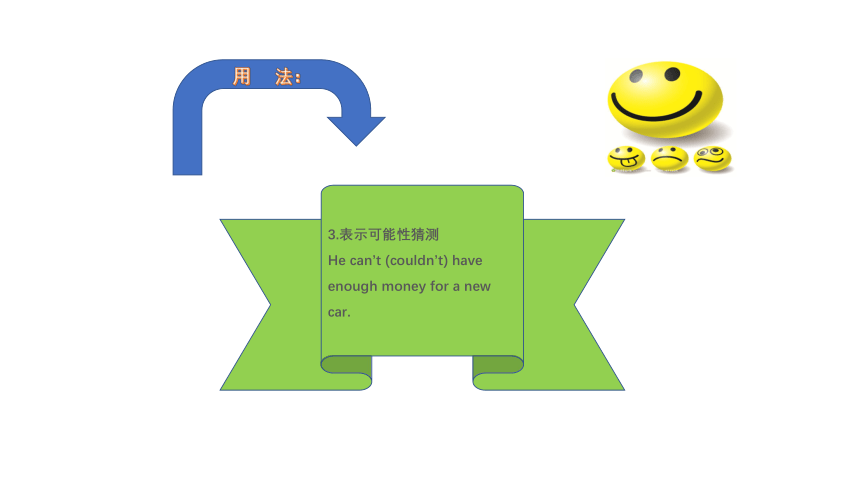
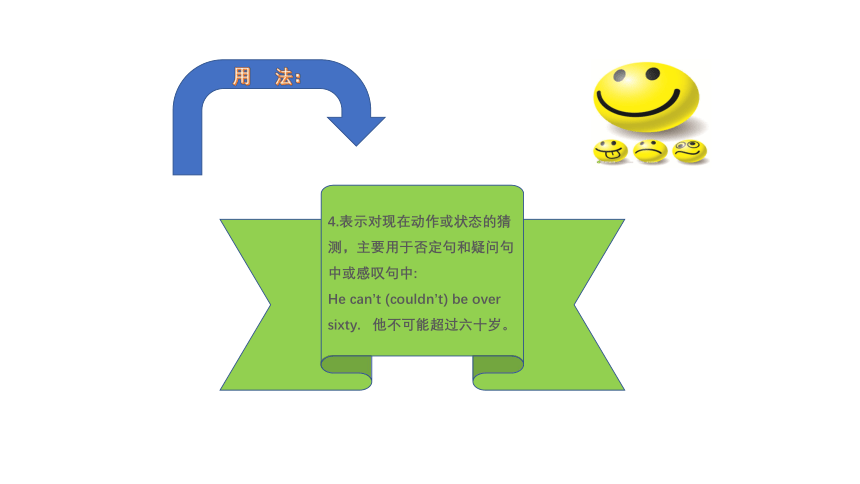
文档简介
(共22张PPT)
情态动词can may must
情态动词
不会用?
不懂?
分不清楚?
They can dance!.
Warm-up
They can sing!
简介
They can ride a bike.
He can not drive a car.
can+动词原形(无人称和数的变化)
情态动词Can(could)
1.表示能力(体力,知识,技能等)。
Mary can speak three languages.
= Mary_____speak three languages.
用 法:
(1).can只有一般现在时一般过去时。I will not be able to come this afternoon.
(2).表示经过努力才得以做成某事 ----- be able to
区 别:
2.表示请求,允许
---- Can I go now
----Yes,you can/No,you can not.
用 法:
3.表示可能性猜测
He can’t (couldn’t) have enough money for a new car.
用 法:
4.表示对现在动作或状态的猜测,主要用于否定句和疑问句中或感叹句中:
He can’t (couldn’t) be over sixty. 他不可能超过六十岁。
用 法:
5.could表示比can更委婉客气的提出问题或陈述看法,指的是现在时间。
Could you lend me a hand 帮我一把好吗?
用 法:
课堂练习:
1. "__________ I take it out " "I'm sorry, you __________." (☆☆☆☆)
A. Could ...couldn't B. Might...might not
C. Could...can D. May...can
2.—Listen!Helen is singing in the next room. —It_____be Helen. She has gone to Beijing.(☆☆☆☆)
A.can‘t B.mustn’t C.may D.should
3. — __________I smoke here (☆☆☆)
— No, you mustn’t.
A. Can B. May C. Must D. Need
简介
---May I visit Lucy on Sunday, Mum
---- Yes, you may. .
情态动词May(might)
1)表允许,询问或说明一件事可不可以做,might指过去时间;但在疑问句中might也可指现在时间,语气比may更委婉。
May (Might) I ask for a photo of your baby
在回答以may引起的问句时,肯定回答是一般可仍用may,或Yes, please. / Certainly./Sure./Of course. ;
否定回答根据说话人的语气由强到弱分别选用: must not(mustn’t)(禁止)/ had better not(最好别)/ may not(不行)
用 法
用 法:
2) may表可能,但所表示的可能性不如can所表示的那样肯定。might可以指过去时间,也可以指现在时间,但语气更加不肯定。
He may be at home.
他可能在家。
They might be having a meeting, but I’m not sure.
他们有可能在开会,不过我不肯定。
简介
情态动词Must(have to )
用 法:
1)表示 “必须”(主观看法)时,用于肯定句或疑问句;用于否定句时表示“禁止”。
We must do everything step by step.
我们一切都必须循序渐进地做。
You must get home before 9:00.
用 法:
2)表示揣测。意为“想必、准是、一定”等,只用于肯定句。
He must be ill. He looks so pale. 他准是病了。他的脸色苍白。
3)must的疑问句,肯定回答用must, 否定回答用needn’t或don’t have to。
课堂练习:
1. __________ to have lunch with us today (☆☆☆)
A. Do you likes B. Would you like
C. Will you liked D. Have you liked
2. --Is John coming by train
--He should, but he __________ not. He likes driving his car. (☆☆☆☆)
A. must B. can C. need D. may
3. Peter __________ come with us tonight, but he isn't very sure yet. (☆☆☆)
A. must B. can C. may D. will
4. I thought you __________ be hungry, so I have brought you some cakes. (☆☆☆)
A. may B. might C. can D. could
5. Come on! We __________ hurry because there isn't much time left. (☆☆☆)
A. may B. must C. can D. need
课堂练习:
6.—Would you like to drink some juice
— Thanks._________,but I have drunk a lot if tea.
A.I'd love to B.I think so C.I'm afraid not D. I don't think so.
7.—May I smoke here
—No, you______! Look, there is a “NO SMOKING”sign here.
A.may B.may not C.needn't D.mustn't
8.—Listen!Helen is singing in the next room.
—It_____be Helen. She has gone to Beijing.
A.can't B.mustn't C.may D.should
9.—What do drivers do when the traffic lights turn red
—They______stop and wait till the green light.
A.must B.can C.may D.need
10. She ________ know the answer, but I'm not sure.
A. maybe B. may be C. may D. must
A
can/could
B
may/might
C
must
课堂小结
HOMEWORK:
1.-You must come back every month. -Yes, I ________.
A. will B. must C. should D. can
2. She ________ know the answer, but I'm not sure.
A. maybe B. may be C. may D. must
3. - Must we clean the room right now? - No, you____. You _____clean it after lunch.
A. needn't;may B. needn't;must C. Mustn't; can D. mustn't;may
4. John________ come to see us tonight, but he isn't very sure yet.
A. may B. can C. has to D. must
5. Children ________ play with fire.
A. mustn't B. can't C. shouldn't D. needn't
6. -________ I come in, Mr Green? -Yes,come in, please.
A. Must B. Need C. Will D. May
7. -Must I finish the work today? -No, you ________. You ________ finish it tomorrow.
A. mustn't; may B. can't; can C. needn't; may D. needn't; must
8. John___ come to see us tonight, but he isn't very sure yet.
A. may B. can C. has to D. must
9.They ___ do well in the exam.
A. can be able to B. be able to C. can able to D. are able to
10.-May I take this book out -No, you___.
A. can't B. may not C. needn't D. aren't
You are the best!
情态动词can may must
情态动词
不会用?
不懂?
分不清楚?
They can dance!.
Warm-up
They can sing!
简介
They can ride a bike.
He can not drive a car.
can+动词原形(无人称和数的变化)
情态动词Can(could)
1.表示能力(体力,知识,技能等)。
Mary can speak three languages.
= Mary_____speak three languages.
用 法:
(1).can只有一般现在时一般过去时。I will not be able to come this afternoon.
(2).表示经过努力才得以做成某事 ----- be able to
区 别:
2.表示请求,允许
---- Can I go now
----Yes,you can/No,you can not.
用 法:
3.表示可能性猜测
He can’t (couldn’t) have enough money for a new car.
用 法:
4.表示对现在动作或状态的猜测,主要用于否定句和疑问句中或感叹句中:
He can’t (couldn’t) be over sixty. 他不可能超过六十岁。
用 法:
5.could表示比can更委婉客气的提出问题或陈述看法,指的是现在时间。
Could you lend me a hand 帮我一把好吗?
用 法:
课堂练习:
1. "__________ I take it out " "I'm sorry, you __________." (☆☆☆☆)
A. Could ...couldn't B. Might...might not
C. Could...can D. May...can
2.—Listen!Helen is singing in the next room. —It_____be Helen. She has gone to Beijing.(☆☆☆☆)
A.can‘t B.mustn’t C.may D.should
3. — __________I smoke here (☆☆☆)
— No, you mustn’t.
A. Can B. May C. Must D. Need
简介
---May I visit Lucy on Sunday, Mum
---- Yes, you may. .
情态动词May(might)
1)表允许,询问或说明一件事可不可以做,might指过去时间;但在疑问句中might也可指现在时间,语气比may更委婉。
May (Might) I ask for a photo of your baby
在回答以may引起的问句时,肯定回答是一般可仍用may,或Yes, please. / Certainly./Sure./Of course. ;
否定回答根据说话人的语气由强到弱分别选用: must not(mustn’t)(禁止)/ had better not(最好别)/ may not(不行)
用 法
用 法:
2) may表可能,但所表示的可能性不如can所表示的那样肯定。might可以指过去时间,也可以指现在时间,但语气更加不肯定。
He may be at home.
他可能在家。
They might be having a meeting, but I’m not sure.
他们有可能在开会,不过我不肯定。
简介
情态动词Must(have to )
用 法:
1)表示 “必须”(主观看法)时,用于肯定句或疑问句;用于否定句时表示“禁止”。
We must do everything step by step.
我们一切都必须循序渐进地做。
You must get home before 9:00.
用 法:
2)表示揣测。意为“想必、准是、一定”等,只用于肯定句。
He must be ill. He looks so pale. 他准是病了。他的脸色苍白。
3)must的疑问句,肯定回答用must, 否定回答用needn’t或don’t have to。
课堂练习:
1. __________ to have lunch with us today (☆☆☆)
A. Do you likes B. Would you like
C. Will you liked D. Have you liked
2. --Is John coming by train
--He should, but he __________ not. He likes driving his car. (☆☆☆☆)
A. must B. can C. need D. may
3. Peter __________ come with us tonight, but he isn't very sure yet. (☆☆☆)
A. must B. can C. may D. will
4. I thought you __________ be hungry, so I have brought you some cakes. (☆☆☆)
A. may B. might C. can D. could
5. Come on! We __________ hurry because there isn't much time left. (☆☆☆)
A. may B. must C. can D. need
课堂练习:
6.—Would you like to drink some juice
— Thanks._________,but I have drunk a lot if tea.
A.I'd love to B.I think so C.I'm afraid not D. I don't think so.
7.—May I smoke here
—No, you______! Look, there is a “NO SMOKING”sign here.
A.may B.may not C.needn't D.mustn't
8.—Listen!Helen is singing in the next room.
—It_____be Helen. She has gone to Beijing.
A.can't B.mustn't C.may D.should
9.—What do drivers do when the traffic lights turn red
—They______stop and wait till the green light.
A.must B.can C.may D.need
10. She ________ know the answer, but I'm not sure.
A. maybe B. may be C. may D. must
A
can/could
B
may/might
C
must
课堂小结
HOMEWORK:
1.-You must come back every month. -Yes, I ________.
A. will B. must C. should D. can
2. She ________ know the answer, but I'm not sure.
A. maybe B. may be C. may D. must
3. - Must we clean the room right now? - No, you____. You _____clean it after lunch.
A. needn't;may B. needn't;must C. Mustn't; can D. mustn't;may
4. John________ come to see us tonight, but he isn't very sure yet.
A. may B. can C. has to D. must
5. Children ________ play with fire.
A. mustn't B. can't C. shouldn't D. needn't
6. -________ I come in, Mr Green? -Yes,come in, please.
A. Must B. Need C. Will D. May
7. -Must I finish the work today? -No, you ________. You ________ finish it tomorrow.
A. mustn't; may B. can't; can C. needn't; may D. needn't; must
8. John___ come to see us tonight, but he isn't very sure yet.
A. may B. can C. has to D. must
9.They ___ do well in the exam.
A. can be able to B. be able to C. can able to D. are able to
10.-May I take this book out -No, you___.
A. can't B. may not C. needn't D. aren't
You are the best!
同课章节目录
- 词法
- 名词
- 动词和动词短语
- 动词语态
- 动词时态
- 助动词和情态动词
- 非谓语动词
- 冠词
- 代词
- 数词和量词
- 形容词副词及其比较等级
- 介词和介词短语
- 连词和感叹词
- 构词法
- 相似、相近词比较
- 句法
- 陈述句
- 一般疑问句和否定疑问句
- 特殊疑问句及选择疑问句
- 反意疑问句
- 存在句(There be句型)
- 宾语从句
- 定语从句
- 状语从句
- 主谓一致问题
- 简单句
- 并列句
- 复合句
- 主谓一致
- 主、表语从句
- 名词性从句
- 直接引语和间接引语
- 虚拟语气
- 感叹句
- 强调句
- 倒装句
- 祈使句
- 句子的成分
- 句子的分类
- 题型专区
- 单项选择部分
- 易错题
- 完形填空
- 阅读理解
- 词汇练习
- 听说训练
- 句型转换
- 补全对话
- 短文改错
- 翻译
- 书面表达
- 任务型阅读
- 语法填空
- 其他资料
